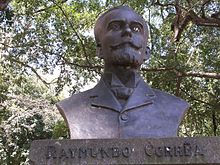Raimundo Correia
Raimundo da Mota de Azevedo Correia (born May 13, 1859 in Mogúncia, Maranhão state , Brazil ; † September 13, 1911 in Paris , France ) was a Brazilian poet and lawyer. He was an important representative of the Brazilian late romanticism and Parnassism , and a founding member of the Academia Brasileira de Letras .
Life
Raimundo Correia had an unusual birth: he was born on the Brazilian ship São Luis , which was anchored off the coast of Maranhão province at the time. His family were members of the Brazilian upper middle class, with contacts up to the imperial family. His father was Jose Mota de Azevedo Correia , his mother was Maria Clara Vieira da Silva . As a child he went to Rio de Janeiro , where he attended the Colegio Nacional , one of the leading boarding schools in the country. His classmates there included children who later belonged to the political and cultural elite of Brazil: Raul Pompeio , Teofilo Dias , Eduardo Prado , Affonso Celso , Augusto de Lima , Valentim Magalhães , Silva Jardim . After leaving school, he began to study law at the Law Faculty of the University of São Paulo in 1877. In 1879 - while still a student - he made his literary debut with the volume of poetry "Primeiros Sonhos". After completing his studies in 1884, he moved to the state of Rio de Janeiro, where he worked as a magistrate and orphan judge in cities such as São João da Barra and Vassourense. It was there that he wrote for a magazine for the first time: he published an essay for "O Vassourense", a city's cultural magazine founded by the poet, musician and humanist Lucindo Filho (1847-1896) .
In 1884 he married Mariana Sodre. In 1889 he went into local politics and became State Secretary of the Governorate of Rio de Janeiro. However, he only held this office for a very short time. Then he moved to the state of Minas Gerais , where he worked as a magistrate in the city of São Gonçalo de Sapucai. Then followed an appointment as Professor of Law at the University of Ouro Preto . Finally he made a career at the federal level: In the government of Prudente de Morais he became liaison for the Portuguese-Brazilian relations of the government in 1897. In this capacity he lived from 1887 to 1889 in the Portuguese capital, Lisbon . In 1899 he returned to Brazil, briefly got a job in Fluminense Rio de Janeiro , before he worked as a judge in Rio de Janeiro from 1900 until his death in 1911. For health reasons he went to Paris in 1911, where he died shortly after his arrival as a result of his illness. His body was buried in Paris until 1920 when it was transferred to Brazil.
Romantic and Parnassic work
Correia is often referred to as a late romantic, especially through his first work " Primeiros Sonhos ". Already through his second work " Sinfonia " he was inclined to Parnassism. The sonnet " As pombas " is considered to be one of the best and most famous sonnets in the Portuguese language of the 19th century. His work is also characterized by a great love for nature, formal perfection, a recourse to classical culture, pessimism and disillusionism.
Besides Alberto de Oliviera and Olavo Bilac , he belonged to the so-called "Parnassian Triad".
Academia Brasileira de Letras
Raimundo Correia was a founding member of the Academia Brasileira de Letras in 1897 , where he was the owner of seat no. 5, for which he chose Bernardo Guimarães as the patron saint . Correira is one of the immortals, the "Imortais", of Brazilian literature.
plant
- Primeiro Sonhos . 1879. Poetry.
- Symphonias. 1883. Poetry.
- Versos e Versoes. 1887. Poetry.
- Aleluias. 1891. Poetry.
- Poesia. 1898. Poetry.
A volume of Poesia completa e prosa. Introdução geral was published by Aguilar in Rio de Janeiro in 1961, supplemented by contributions by Waldir Ribeiro do Val and Afonso Celso. This standard edition is still valid today.
So far, only a few poems out of ten have been translated into German.
literature
- Irwin Stern (Ed.): Dictionary of Brazilian literature. Greenwood Press, New York 1988, ISBN 0-313-24932-6 , pp. 91-92.
- Péricles da Silva Ramos (Ed.): Poesia panarsiana. Melhoramentos, São Paulo 1967.
Web links
- Biography and bibliography on the website of the Academia Brasileira de Letras , Portuguese
- Literature by and about Raimundo Correia in the catalog of the Ibero-American Institute of Prussian Cultural Heritage, Berlin
- Raimundo Correia - biografia do escritor. In: infoescola.com. InfoEscola(Brazilian Portuguese). .
- Jornal de Poesia. In: jornaldepoesia.jor.br. Retrieved August 24, 2019 .
- Fabiane Breda: Raimundo Correia. In: com.br. (Brazilian Portuguese).
Individual evidence
- ↑ Irwin Stern (Ed.): Dictionary of Brazilian literature. Greenwood Press, New York 1988, ISBN 0-313-24932-6 , pp. 234-236.
- ↑ Klaus Küpper: Bibliography of Brazilian literature. Prose, poetry, essay and drama in German translation. Küpper, Cologne / Ferrer de Mesquita, Frankfurt am Main 2012, ISBN 978-3-939455-09-7 , pp. 147-148.
| personal data | |
|---|---|
| SURNAME | Correia, Raimundo |
| ALTERNATIVE NAMES | Azevedo Correia, Raimundo da Mota de |
| BRIEF DESCRIPTION | Brazilian poet and lawyer |
| DATE OF BIRTH | May 13, 1859 |
| PLACE OF BIRTH | near Mogúncia, Maranhão State , Brazil |
| DATE OF DEATH | September 13, 1911 |
| Place of death | Paris , France |

